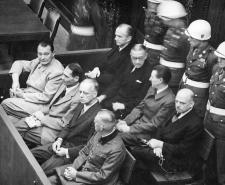
Read more about WW2

From the Battle of Hastings to the Cuban Missile Crisis, discover what major historical events have taken place in the month of October.
After nearly a year, the International Military Tribunal in Nuremberg, Germany, condemned 12 high-ranking Nazis to death. This included Hermann Goering, the founder of the Gestapo and commander-in-chief of the Luftwaffe.
The ‘Space Age’ was heralded with the launch of Sputnik 1, as the Soviet Union sent the first satellite into orbit.
The co-founder of the revolutionary technology company Apple passed away at the age of 56 after complications from pancreatic cancer.
The socialist revolution and guerrilla leader Ernesto ‘Che’ Guevara was killed at age 39 by U.S.-backed Bolivian forces.
A bitter colonial war began between Britain and the Boers in South Africa. The Boers (Boer meaning ‘farmer’) were the descendants of Dutch East India Company settlers at the Cape of Good Hope. The conflict lasted until 1902 and ended with a British victory, with the Boer territories becoming British colonies.
After 33 days at sea, Italian explorer Christopher Columbus landed in the New World after sighting the Bahamas.
After descending too early into Santiago, Chile, Uruguayan Air Force Flight 571 crashed high in the Andes mountains. Of the 45 passengers and crew, 12 died on impact whilst a further 17 perished in the harsh environment during the coming months. In the end, 16 people were rescued.
After 69 days underground, 33 Chilean miners were rescued. They were trapped 2,300 feet below the surface because of a cave-in at the San José Mine.
The great armies of King Harold II of England and Duke William of Normandy clashed as they fought for the throne of England. The Saxon king was defeated and a new era of English and European history was ushered in.
Ever since the failed Bay of Pigs invasion in early 1961, tensions between the U.S. and Soviet Union over Cuba had been escalating. When an American spy plane confirmed that Soviet medium-range missiles - capable of carrying nuclear warheads - had arrived in Cuba, nuclear war became a very real reality.
Created by American animator and entrepreneur Walt Disney and his brother, the studio went on to become one of the biggest entertainment companies in the world.
During the Reign of Terror, a period during the French Revolution, Queen Marie Antoinette was guillotined after being condemned for treason. Nine months prior, her husband, King Louis XVI, had suffered a similar fate.
It is one of the most famous naval battles in history and took place off the coast of Cádiz, Spain. Without losing a single ship, a British fleet under Vice-Admiral Horatio Nelson, decimated a combined French and Spanish fleet, ending Emperor Napoleon’s ambitions to invade Britain. Nelson was mortally wounded during the battle and died on his ship HMS Victory.
The Battle of Agincourt took place in northern France and was part of the Hundred Years’ War, a conflict between England and France. Although vastly outnumbered, the English, under King Henry V, claimed a historic victory against the French.
Immortalised in a poem by Alfred Lord Tennyson, the Charge of the Light Brigade occurred during the Crimean War. Lord Cardigan infamously led a British cavalry charge against well-defended Russian artillery at Balaclava. Of the 670 that rode in, 110 were killed and around 160 were wounded.
With the demise of the 600-year-old Ottoman Empire after WWI, Turkey was officially declared a republic on 29 October 1923.
In July 1956, Egyptian leader General Nasser nationalised the Suez Canal, removing control from British and French influences. In retaliation, a joint Israeli-British-French attack on Egypt was conducted, heralding the start of the Suez Crisis. Political pressure from the U.S., Soviet Union and United Nations led to the withdrawal of the invading forces just over a week later.
The English explorer was one of the most notable figures of the Elizabethan era, playing a part in England's defence of the Spanish Armada, as well as leading expeditions to the Americas. Eventually, he fell afoul of King James I and was beheaded on charges of treason.
After nearly four months of heroic defence by the RAF, the Battle of Britain came to an end. Had the German Luftwaffe successfully claimed dominance over British skies, Hitler would likely have ordered a full-scale invasion.